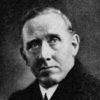All who strive to live for something beyond mere selfish aims find their capacities for doing good very inadequate to their aspirations. They do so much less than they want to do, and so much less than they, at the outset, expected to do, that their lives, viewed retrospectively, inevitably look like failure.
Lydia Maria Child (1802-1880) American abolitionist, activist, journalist, suffragist
Letter to John Fraser (1868)
(Source)
Quotations about:
results
Note not all quotations have been tagged, so Search may find additional quotes on this topic.
Consequences are unpitying.
George Eliot (1819-1880) English novelist [pseud. of Mary Ann Evans]
Adam Bede, Book 1, ch. 16 “Links” [Mr. Irwine] (1859)
(Source)
I write poetry, prose, and everything I do, I do on the principle of Russian borscht. You can throw everything into it — beets, carrots, cabbage, onions, everything you want. What’s important is the result, the taste of the borscht.
Yevgeny Yevtushenko (1933-2017) Russian poet, writer, film director, academic [Евге́ний Евтуше́нко, Evgenij Evtušenko]
“Yevtushenko: A Soviet Poet Turns to Movie Making,” New York Times (2 Feb 1986)
(Source)
Users do not care about what is inside the box, as long as the box does what they need done.
Jef Raskin (1943-2005) American computer scientist, writer
The Humane Interface, 1-5 (2000)
(Source)
The worship of God is a Duty; the hearing and reading of Sermons may be useful; but, if Men rest in Hearing and Praying, as too many do, it is as if a Tree should Value itself on being water’d and putting forth Leaves, tho’ it never produc’d any Fruit.
Benjamin Franklin (1706-1790) American statesman, scientist, philosopher, aphorist
Letter to Joseph Huey (6 Jun 1753)
(Source)
Success covers a multitude of blunders, and the want of it hides the greatest gallantry and good conduct.
Horatio Nelson (1758-1805) British admiral
Letter to Andrew Hamond (1797)
(Source)
Often misattributed to George Bernard Shaw.
Things never turn out either so well or so badly as they logically ought to do.
William Ralph Inge (1860-1954) English prelate [Dean Inge]
“The Future of the English Race,” Galton Lecture (1919), Outspoken Essays: First Series (1920)
(Source)
Nations are most commonly saved by the worst men in them. The virtuous are too scrupulous to go to the lengths which are necessary to rouse the people against their tyrants.
Horace Walpole (1717-1797) English novelist, letter writer
Memoirs of the Reign of King George III, Vol. 1, ch. 12 (1859)
(Source)
Variants:
- "The adventurer's career suggests the reflection that nations are usually saved by their worse men, since the virtuous are too scrupulous to go to the lengths needed to rouse the people against their tyrants." (Source)
- "The virtuous are too scrupulous to go to the lengths that are necessary to rouse the people against their tyrants."
- Modern paraphrase: "No great country was ever saved by good men because good men will not go to the lengths necessary to save it."
- Modern paraphrase: "No great country was ever saved by good men, because good men may not go to the lengths that may be necessary."
There is always some peace in having submitted to the right. Don’t spoil it by worrying about the results, if you can help it. It is not your business to succeed (no one can be sure of that) but to do right: when you have done so, the rest lies with God ….
C. S. Lewis (1898-1963) English writer, literary scholar, lay theologian [Clive Staples Lewis]
Letter to Arthur Greeves, Collected Letters of C. S. Lewis, Vol. 2: 1931-1949 (2004)
(Source)
A good tree cannot bring forth evil fruit, neither can a corrupt tree bring forth good fruit. Every tree that bringeth not forth good fruit is hewn down, and cast into the fire. Wherefore by their fruits ye shall know them.
The Bible (The New Testament) (AD 1st - 2nd C) Christian sacred scripture
Matthew 7:18–20 (KJV)
Alt. trans.:
- "A healthy tree cannot bear bad fruit, and a poor tree cannot bear good fruit. And any tree that does not bear good fruit is cut down and thrown in the fire. So then, you will know the false prophets by what they do." (GNT)
- "A good tree cannot bear bad fruit, nor can a bad tree bear good fruit. Every tree that does not bear good fruit is cut down and thrown into the fire. Thus you will know them by their fruits." (NRSV)
[Capitalism is] the astonishing belief that the nastiest motives of the nastiest men somehow or other work for the best results in the best of all possible worlds.
John Maynard Keynes (1883-1946) English economist
(Attributed)
Attributed by Sir George Schuster, Christianity and Human Relations in Industry (1951). Frequently quoted, but no direct citation found. More information here.
Variations:
- "... the extraordinary belief that the nastiest of men for the nastiest of motives will somehow work for the benefit of all."
- "... the astounding belief that the most wickedest of men will do the most wickedest of things for the greatest good of everyone."
- "The great merit of the capitalist system, it has been said, is that it succeeds in using the nastiest motives of nasty people for the ultimate benefit of society." (written by E. A. G. Robinson, Monopoly (1941). (Robinson was a colleague of Keynes.)
Stupidity is the same as evil if you judge by the results.
Margaret Atwood (b. 1939) Canadian writer, literary critic, environmental activist
Surfacing, ch. 3 (1972)
(Source)
You never can tell when you do an act
Just what the result will be;
But with every deed you are sowing a seed,
Though the harvest you may not see.Ella Wheeler Wilcox (1850-1919) American author and poet.
“You Never Can Tell,” Custer And Other Poems (1896)
(Source)
No action, whether foul or fair,
Is ever done, but it leaves somewhere
A record, written by fingers ghostly,
As a blessing or a curse, and mostly
In the greater weakness or greater strength
Of the acts which follow it.
Consider and act with reference to the true ends of existence. This world is but the vestibule of an immortal life. Every action of our lives touches on some chord that will vibrate in eternity.
Edwin Hubbell Chapin (1814-1880) American clergyman
(Attributed)
(Source)
Quoted in Charles Northend, Memory Gems (1890).
Variant: "Every action of your life touches on some chord that will vibrate in eternity." ["Advice to the Young," quoted in Charles W. Sanders, Sanders' Union Fourth Reader (1873)]
And whereas sense and memory are but knowledge of fact, which is a thing past and irrevocable, science is the knowledge of consequences, and dependence of one fact upon another; by which, out of that we can presently do, we know how to do something else when we will, or the like, another time: because when we see how anything comes about, upon what causes, and by what manner; when the like causes come into our power, we see how to make it produce the like effects.
Beware of false prophets, who come to you in sheep’s clothing but inwardly are ravenous wolves. You will know them by their fruits. Are grapes gathered from thorns, or figs from thistles?
The Bible (The New Testament) (AD 1st - 2nd C) Christian sacred scripture
Matthew 7:15-16 [NRSV]
Alt. trans.:
- "Beware of false prophets, which come to you in sheep's clothing, but inwardly they are ravening wolves. Ye shall know them by their fruits. Do men gather grapes of thorns, or figs of thistles?" [KJV]
- "Watch out for false prophets. They come to you in sheep’s clothing, but inwardly they are ferocious wolves. By their fruit you will recognize them. Do people pick grapes from thornbushes, or figs from thistles?" [NIV]
- "Be on your guard against false prophets; they come to you looking like sheep on the outside, but on the inside they are really like wild wolves. You will know them by what they do. Thorn bushes do not bear grapes, and briers do not bear figs." [GNT]
Science is like sex: sometimes something useful comes out, but that is not the reason we are doing it.
Richard Feynman (1918-1988) American physicist
(Attributed)
Many variations can be found for this quotation (none of them with citation); the word "Science" and "Physics" are often interchanged:As noted here, Frank Oppenheimer (a colleague of Feynman's) was quoted saying, "There's a lot of practical fruits to understanding, but it's like sex. There are practical fruits to sex, but nobody would say that's why you do it, normally." Feynman and Oppenheimer may well have collaborated on the general phrasing, or taken it from one another.
- "Science is like sex, it has its practical purposes, but that's not why we do it."
- "Science is like sex. Sometimes something useful comes out, but that is not why we are doing it."
- Physics is like sex. Sure, it may give some practical results, but that's not why we do it."
Give me but virtuous actions, and I will not quibble and chicane about the motives.
Lord Chesterfield (1694-1773) English statesman, wit [Philip Dormer Stanhope]
Letter to his son, #161 (5 Sep 1748)
(Source)





























